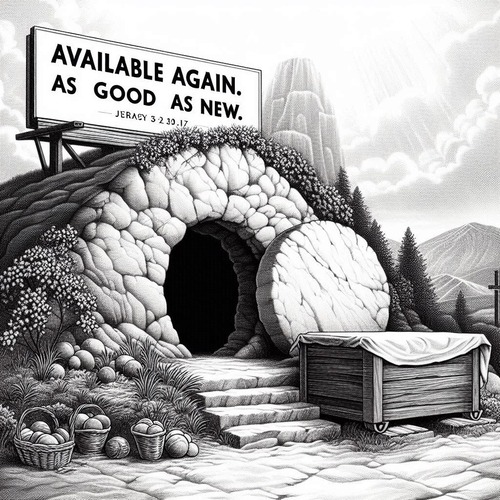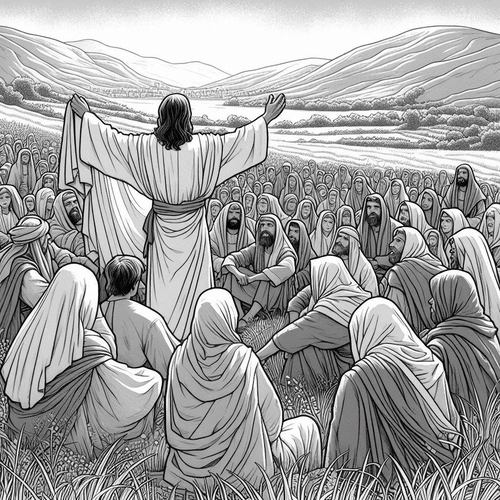Was Jesus Abandoned by the Father on the Cross?
WHY WE ANSWER IN THE NEGATIVE
“My God, my God, why have you forsaken me?” These words from the cross have echoed through history, and for many believers today, they represent the moment when the Father turned His back on the Son. Popular evangelical teaching often presents this as the climactic moment of the atonement—when Jesus experienced the ultimate horror of separation from God so that we never would.
But is this understanding correct? Does it align with Scripture and sound theology? We believe the answer is no, and the implications of getting this wrong are more serious than we might think.
THE BIBLICAL CASE AGAINST ABANDONMENT
Understanding the Cry of Dereliction: When Jesus cried out “My God, my God, why have you forsaken me?” He wasn’t expressing literal abandonment but fulfilling prophecy. These are the opening words of Psalm 22, and any first-century Jew would have immediately recognised the reference. But here’s what’s crucial: Psalm 22 doesn’t end in despair—it ends in triumph and vindication.
The psalm moves from “My God, my God, why have you forsaken me?” to “He has not despised or abhorred the affliction of the afflicted, and he has not hidden his face from him, but has heard when he cried to him” (v. 24). By quoting this psalm, Jesus wasn’t declaring divine abandonment but pointing to His messianic identity and ultimate victory over suffering.
The Trinity Cannot Be Divided: More fundamentally, the idea the Father abandoned the Son threatens the doctrine of the Trinity itself. The three persons of the Godhead work together in perfect unity—what theologians call the opera trinitatis ad extra sunt indivisa (the external works of the Trinity are indivisible).
Jesus Himself taught this principle: “He who sent me is with me; he has not left me alone” (John 8:29). Even facing the cross, he declared, “Yet I am not alone, for the Father is with me” (John 16:32). If the Father truly abandoned the Son, we would have a fundamental rupture in the Godhead—something that would make the Trinity cease to be Trinity.
Remember, Scripture too consistently presents the Father as actively involved in the crucifixion. Acts 2:23 speaks of Jesus being “delivered up according to the definite plan and foreknowledge of God.” Romans 8:32 says the Father “did not spare his own Son but gave him up for us all.” This is not the language of abandonment but of deliberate, loving sacrifice.
Jesus’ Final Words Perhaps most tellingly, Jesus’ final words from the cross were not a cry of abandonment but of intimate trust: “Father, into your hands I commit my spirit” (Luke 23:46). This hardly sounds like someone who has been cut off from divine fellowship. Instead, it reveals unbroken communion with the Father even in death.
THE THEOLOGICAL PROBLEMS WITH ABANDONMENT
Trinitarian Heresy: The abandonment theory creates serious theological problems. If the Father can abandon the Son, then either the Trinity is divisible (which denies divine unity) or the Son temporarily ceased to be God (which denies divine immutability). Both options lead us into ancient heresies that the church has rightly rejected.
Soteriological Confusion: The abandonment view also confuses how the atonement actually works. It suggests that our salvation depends on broken divine fellowship rather than satisfied divine justice. But Scripture teaches that Christ’s sacrifice was effective because he maintained perfect fellowship with the Father while bearing the penalty for our sin.
The beauty of penal substitution: Jesus experienced what we deserved (condemnation and wrath) while maintaining what we could never achieve (perfect fellowship with God). As Paul puts it, “For our sake he made him to be sin who knew no sin, so that in him we might become the righteousness of God” (2 Corinthians 5:21).
WAS JESUS ABANDONED BY THE FATHER? THE REFORMED ALTERNATIVE
So how do we understand Jesus’ suffering if not as abandonment? The Reformed tradition believes Jesus bore the full weight of God’s wrath against sin without losing His essential union with the Father. This isn’t a contradiction—it’s the very heart of the gospel.
When Jesus spoke of drinking the “cup” the Father had given him (Matthew 26:39), He was referring to the cup of divine wrath described throughout the Old Testament. This was judicial punishment, not relational separation. Isaiah 53:10 tells us “it was the will of the Lord to crush him”—the Father was actively involved in the Son’s suffering, not absent from it.
The mechanism of substitution works precisely because Jesus could experience God’s wrath against sin while maintaining perfect fellowship with God. He stood in our place, bearing what we deserved, while never losing what we could never achieve on our own.
ADDRESSING COMMON OBJECTIONS
- “But didn’t Jesus experience hell, which is separation from God?” Hell is indeed punishment, but the essence of hell isn’t abandonment by God—it’s experiencing God’s wrath without any mediator. Jesus experienced the wrath due to sin without experiencing the relational separation that defines hell. He remained the beloved Son even while bearing our judgment.
- “What about the darkness during the crucifixion?” The supernatural darkness (Matthew 27:45) was a sign of God’s judgment, not his absence. This fulfilled the prophecy of Amos 8:9 about darkness coming at noon. It represented God’s active judgment on sin, not his passive withdrawal from the scene.
- “How else should we understand the cry of dereliction?” Jesus’ cry expressed the weight of bearing divine wrath, not literal abandonment. He was identifying with the suffering described in Psalm 22 while pointing forward to the vindication that the psalm promises. It was a cry of anguish, not of broken fellowship.
WHY THIS MATTERS FOR US
Getting this right has profound implications for Christian living. If Jesus maintained fellowship with the Father while bearing our sin, then our fellowship with God is absolutely secure. We never need to fear God will abandon us, because He didn’t abandon his Son while the Son was bearing the weight of all human sin.
This understanding also helps us properly interpret our own suffering. When we go through trials, we might feel abandoned by God, but we’re not actually abandoned. Jesus’ example teaches us to trust the Father’s presence even when we can’t feel it.
Finally, this view preserves the beauty of Trinitarian cooperation in our salvation. The Father didn’t engage in cosmic child abuse by abandoning his Son. Rather, the Father, Son, and Holy Spirit worked together in perfect unity to accomplish our redemption. The Father gave the Son, the Son offered himself, and the Spirit enabled the sacrifice.
WAS JESUS ABANDONED BY THE FATHER? THE TRINITARIAN ATONEMENT
The biblical evidence is clear: Jesus wasn’t abandoned by the Father on the cross. He bore the full weight of divine wrath against sin while maintaining perfect fellowship with the Father. This preserves both the reality of penal substitution and the unity of the Trinity.
This isn’t just a theological technicality—it’s the very heart of the gospel. Our salvation rests not on a moment of divine abandonment but on the unbreakable unity of the Triune God working together for our redemption. The Father’s love was demonstrated not in abandoning the Son but in giving him up for us all.
As Paul triumphantly declares, nothing “will be able to separate us from the love of God in Christ Jesus our Lord” (Romans 8:39). If the Father didn’t abandon the Son while he bore our sin, he certainly won’t abandon us who’ve been clothed in the Son’s righteousness.
That’s a foundation we can build our lives on—not a moment of divine abandonment, but the eternal, unshakeable love of the Triune God.
WAS JESUS ABANDONED BY THE FATHER? RELATED FAQs
What did John Calvin teach about Jesus’ cry of dereliction? Calvin believed Jesus experienced “the dread and torment of a condemned and ruined man” without actually being abandoned by the Father. In his Institutes, Calvin explained Christ “in his human nature, was for a time deprived of the consolation of the Spirit” but never lost his essential union with the Father. He emphasised Jesus descended into hell in the sense of experiencing God’s wrath, not literal abandonment. Calvin was careful to distinguish between feeling forsaken and being forsaken, arguing Jesus felt the weight of divine judgement while maintaining His divine nature’s perfect fellowship with the Father.
- How do modern Reformed theologians address this question? RC Sproul consistently taught Jesus experienced the “cup of wrath” without relational separation from the Father. “God cannot forsake God,” He emphasised. Michael Horton argues the abandonment theory threatens the doctrine of the Trinity and Jesus’ cry was “the fulfillment of Psalm 22, not an expression of ontological abandonment.” Both scholars stress Jesus bore the penalty of sin (God’s wrath) while maintaining perfect Trinitarian fellowship. They see the abandonment theory as a dangerous departure from historic Reformed theology that compromises both Trinitarian and Christological doctrine.
- Did any early church fathers teach divine abandonment, or is this a modern invention? The abandonment theory is largely a modern development, particularly popularised in 19th and 20th-century evangelicalism. Early church fathers like Athanasius, Cyril of Alexandria, and Augustine consistently taught the divine nature could not be separated from the human nature in Christ, making true abandonment impossible. They understood Jesus’ cry as expressing the weight of human suffering and the fulfillment of prophecy, not literal divine abandonment. The patristic consensus was that all three persons of the Trinity were actively involved in the atonement, making abandonment theologically incoherent.
How then do we account for the apparent contradiction between Jesus feeling forsaken and not being forsaken? Reformed theology distinguishes between the subjective experience of forsakenness and the objective reality of divine presence. Charles Hodge explained that Jesus could feel the weight of God’s wrath against sin while remaining in perfect fellowship with the Father in his divine nature. JI Packer described this as Jesus experiencing “penal abandonment” (the punishment due to sin) without “personal abandonment” (broken relationship). This distinction preserves both the reality of Jesus’ human suffering and the integrity of the Trinity, showing feeling abandoned doesn’t necessarily mean being abandoned.
- What about the argument that Jesus had to experience hell (separation from God) to save us from it? This argument misunderstands the nature of hell and the mechanics of substitution. As John Murray argued, hell isn’t primarily relational separation but the experience of God’s wrath without any mediator or hope of relief. Jesus experienced the wrath that leads to hell without experiencing hell itself, because He remained the perfect mediator throughout his suffering. Louis Berkhof believed Jesus’ substitution was effective precisely because He could bear our penalty while maintaining His perfect righteousness and divine nature. If Jesus had actually experienced hell (total separation from God), He would have ceased to be the perfect substitute we needed.
- How do we interpret the three hours of darkness during the crucifixion? Reformed scholars generally interpret the darkness as a supernatural sign of God’s judgement, not His absence. Sinclair Ferguson notes the darkness fulfilled Old Testament prophecies about the Day of the Lord (Amos 8:9) and represented God’s active judgement on sin. Rather than indicating divine absence, the darkness demonstrated God’s holy wrath against sin being poured out on Christ. Calvin saw the darkness as a visible sign of the invisible spiritual reality—that Jesus was bearing the weight of divine judgement. This interpretation aligns with the biblical pattern of darkness accompanying divine judgement throughout Scripture.
Are there any legitimate theological traditions that do teach abandonment, and how do Reformed scholars respond? Some Lutheran and certain evangelical traditions have taught forms of abandonment theory, often influenced by 19th-century kenotic theology or modern therapeutic models of the atonement. However, Reformed scholars like Westminster Seminary’s Carl Trueman argue these views inevitably compromise either Trinitarian or Christological doctrine. They point out abandonment theories often stem from a misunderstanding of penal substitution, making it about broken relationships rather than satisfied justice.
WAS JESUS ABANDONED BY THE FATHER? OUR RELATED POSTS
- The Hour Jesus Died: Do the Gospels Contradict Each Other?
- What Were Jesus’ Final Words on the Cross?
- Last Words on the Cross: Into Your Hands I Commit My Spirit
- “It is Finished”: What Does Jesus Mean?
- John 19:28: Why Did Jesus Say ‘I Thirst’?
- ‘Behold Your Mother’: Why Does Jesus Entrust Mary to John?
- Father, Forgive Them: Who Was Jesus Praying For?
- Why Does Jesus Cry, ‘My God My God’?
Editor's Pick

Why Do People Hate the Doctrine of Election?
…WHEN THEY REALLY SHOULDN’T Few Bible doctrines provoke stronger reactions than election. The idea that God chose some for salvation [...]

The Doctrine of Providence: Does God Really Govern All Things?
You’re sitting in the doctor’s office when the diagnosis lands like a thunderclap. Your mind races: Why this? Why now? [...]

No Decay, No Defeat: What It Means That Christ’s Body Saw No Corruption
On the Day of Pentecost, Peter stood before thousands and made a startling claim: David's body decayed in the tomb, [...]
SUPPORT US:
Feel the Holy Spirit's gentle nudge to partner with us?
Donate Online:
Account Name: TRUTHS TO DIE FOR FOUNDATION
Account Number: 10243565459
Bank IFSC: IDFB0043391
Bank Name: IDFC FIRST BANK






